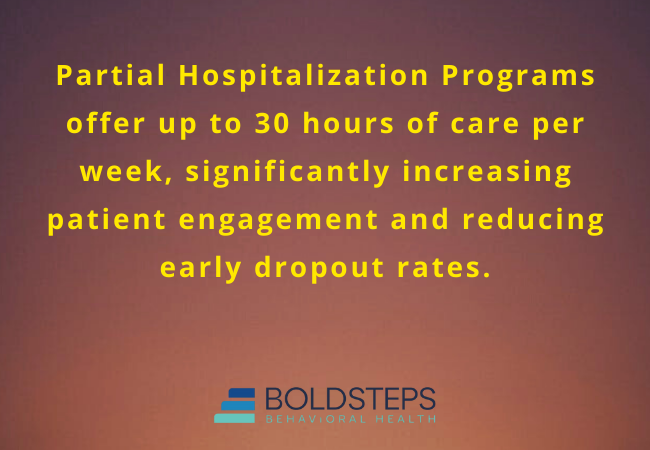When you or your loved one is facing addiction or mental health challenges, deciding on the right level of care is one of the most important choices you’ll make. For many, a Partial Hospitalization Program (PHP) offers the ideal balance: a structured, supportive environment without full residential commitment.
At Bold Steps Behavioral Health, our Partial Hospitalization Program Pennsylvania is built to provide intensive care while empowering individuals to maintain connections with family, community, and real-life responsibilities. PHP plays a crucial role in the full continuum of our services, alongside our Drug Detox Center Pennsylvania, Mental Health Treatment Programs Pennsylvania, Addiction Treatment Programs Pennsylvania, and step-down options like our Intensive Outpatient Program Pennsylvania and Outpatient Treatment Program Pennsylvania.
If you’re considering PHP, you likely have questions: What does a typical day look like? How intensive is it? Will it fit my life? Let’s answer all of that and more.
Understanding the Role of PHP in Recovery
A Partial Hospitalization Program is one of the highest levels of outpatient treatment, offering:
- Medical oversight
- Intensive therapy
- Structured daily schedules
- Community support
PHP is designed for individuals who need more support than traditional outpatient therapy but who do not require 24-hour residential care. It’s ideal for:
- Clients stepping down from detox or residential care
- Those needing daily clinical and therapeutic support
- Individuals managing co-occurring mental health disorders
PHP at Bold Steps provides full-day treatment, typically 5 to 6 days per week, giving clients the tools and structure necessary for long-term recovery while allowing them to return home in the evenings.
Morning: Setting the Tone for Healing
8:00–8:30 AM – Arrival and Health Check
Your day begins by checking in with our compassionate staff at the Addiction Treatment Center Pennsylvania. This includes:
- Brief physical health assessments (especially for clients recently in our Drug Detox Center Pennsylvania)
- Medication administration, if needed
- Emotional check-ins to assess mood, anxiety, or cravings
Our goal is to ensure every client starts the day feeling safe and supported.
8:30–9:00 AM – Morning Mindfulness and Grounding Exercises
We believe in starting the day with intention. Morning sessions might include:
- Guided meditation
- Breathing exercises
- Gentle movement or yoga
- Journaling prompts for self-reflection
These practices prepare clients mentally and emotionally for the therapeutic work ahead, helping reduce anxiety and increase focus.
9:00–10:30 AM – Psychoeducation Group Therapy
Education is empowerment. Morning group sessions focus on building understanding about:
- The science of addiction
- How substances affect the brain and body
- Identifying triggers and high-risk situations
- Understanding the stages of recovery
- Coping with cravings
Clients are encouraged to engage, ask questions, and share experiences in a safe, respectful environment.
Midday: Diving Deeper Into Therapy and Growth
10:45 AM–12:00 PM – Skills Development and Therapy Groups
These sessions focus on practical skills for managing life in recovery:
- Cognitive Behavioral Therapy (CBT): Recognizing and reshaping negative thought patterns
- Dialectical Behavior Therapy (DBT): Learning emotional regulation and distress tolerance
- Relapse prevention techniques
- Stress management tools
Skills practice builds self-efficacy, empowering clients to navigate daily challenges and future stressors.
12:00–12:45 PM – Lunch and Community Building
Lunch offers a break to relax, socialize, and build supportive peer relationships. Recovery can feel isolating — this time fosters connection and community, both essential elements of long-term success.
12:45–2:00 PM – Individual Therapy or Family Therapy Sessions
One-on-one therapy sessions with a dedicated clinician allow clients to:
- Process personal trauma
- Explore emotional challenges
- Develop coping strategies tailored to their experiences
- Address co-occurring mental health concerns like depression, anxiety, or PTSD
For clients with family involvement, sessions may include loved ones to improve communication, rebuild trust, and establish healthy boundaries — all part of our integrated Mental Health Treatment Programs Pennsylvania.
Afternoon: Applying and Integrating Recovery Tools
2:00–3:00 PM – Specialized Workshops and Therapeutic Activities
Afternoon sessions add variety and depth to the day, including:
- Life skills workshops: Budgeting, resume writing, time management
- Art and expressive therapy: Creative outlets for emotional expression
- Nutrition and wellness education: Building healthy habits
- Mind-body practices: Yoga, mindfulness, and movement therapy
Workshops are designed to help clients build confidence, rediscover passions, and prepare for life beyond treatment.
3:00–4:00 PM – Relapse Prevention and Coping Strategies
Clients collaborate to:
- Share real-life scenarios and role-play responses
- Learn to manage cravings and emotional triggers
- Build personalized relapse prevention plans
- Identify supportive resources and coping tools
These sessions are essential as clients prepare to transition to our Intensive Outpatient Program Pennsylvania or Outpatient Treatment Program Pennsylvania.
4:00–4:30 PM – Daily Wrap-Up and Reflection
The day concludes with group reflection:
- Sharing personal wins and challenges
- Reviewing the day’s lessons
- Setting goals for the evening and the next day
This closing ritual reinforces progress and leaves clients feeling motivated and prepared.
Flexibility and Continuity of Care
At Bold Steps Behavioral Health, we understand that recovery is a journey, not a destination. PHP provides structure, but with the flexibility for real-world practice. Clients return home each evening, where they can:
- Practice new coping strategies
- Reconnect with family and loved ones
- Prepare for ongoing treatment the next day
As clients progress, they have the option to transition smoothly into our Intensive Outpatient Program Pennsylvania and eventually, our Outpatient Treatment Program Pennsylvania, ensuring sustained support and growth.
Why Choose PHP at Bold Steps Behavioral Health?
There are many reasons why clients and families choose our Partial Hospitalization Program Pennsylvania:
Continuity from Detox to Recovery
For clients completing detox at our Drug Detox Center Pennsylvania, PHP provides a seamless next step with ongoing medical monitoring and therapeutic support.
Dual Diagnosis Expertise
Our integrated Mental Health Treatment Programs Pennsylvania address co-occurring conditions, ensuring holistic healing.
Compassionate Clinical Team
Our experienced team of clinicians, therapists, and support staff create a nurturing environment focused on individual growth.
Family Involvement
Family therapy and education sessions equip loved ones with tools for healing and supporting recovery.
Practical Life Preparation
We go beyond treatment, preparing clients for long-term success with skills training, relapse prevention, and aftercare planning.
Peer Community
Connection is crucial. In PHP, clients build supportive relationships that can last well beyond treatment.
Conclusion
Choosing a Partial Hospitalization Program Pennsylvania is a significant step toward healing — and you don’t have to take it alone.
At Bold Steps Behavioral Health, our PHP provides the structure, care, and community you need to begin rebuilding your life. Whether you’re transitioning from detox, managing a co-occurring disorder, or starting your recovery journey, our team is ready to support you every step of the way. Call us today at 717.896.1880 to speak with our admissions team and learn more about how PHP at Bold Steps can help you or your loved one find freedom and hope.
Frequently Asked Questions (FAQ)
How long does a typical PHP day last?
Our PHP operates Monday through Friday, typically running 6–7 hours per day, providing intensive, structured care.
Can I work or attend school while in PHP?
PHP is a full-time commitment. If you need more flexibility, our Intensive Outpatient Program Pennsylvania or Outpatient Treatment Program Pennsylvania may be better fits.
What happens after PHP?
We offer seamless transitions to lower levels of care, including IOP and outpatient programs, for ongoing support.
Is family therapy included?
Yes! Family involvement is a cornerstone of our treatment philosophy.
Does insurance cover PHP?
Most insurance plans cover PHP. Call us at 717.896.1880, and our team will help verify your benefits.





